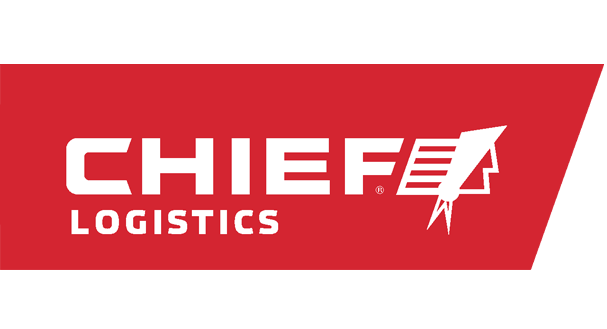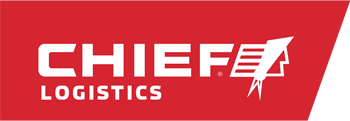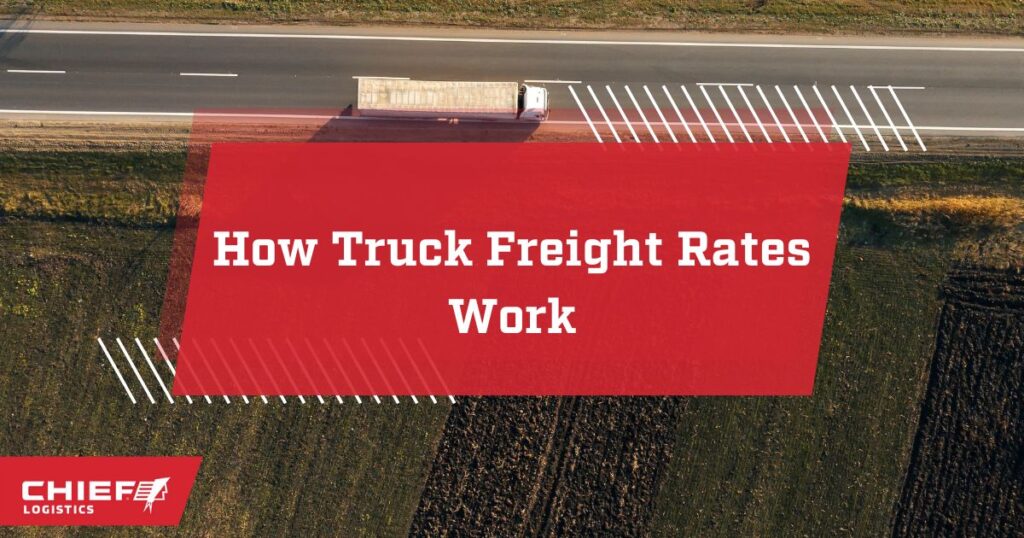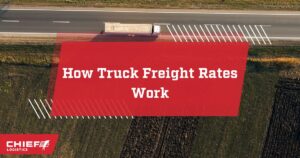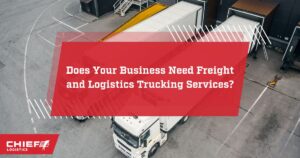How Truck Freight Rates Work: Understanding Logistics Fees
At Chief Logistics, we believe knowledge is essential to making the right decisions. Understanding how truck freight rates work will help you understand how logistic companies optimize your shipping strategy and, ultimately, protect your bottom line.
In this blog, we break down the factors that influence these rates, shining a light on the complex operations of trucking logistics.

What Are Truck Freight Rates?
Let’s start with the basics: What are freight rates? Why should you be charged for something other than fuel?
Well, transporting your cargo from A to B takes a bit more than just fuel. Freight rates are the fees charged by logistics companies for transporting goods via truck. These rates can vary depending on a variety of factors, such as distance, weight, and type of shipment, and they cover all the needs that we have to cover to make sure your cargo reaches its destination optimally.
Types of Truck Freight Rates
Of course, not all trucking companies and rates are the same, and these fees can change drastically depending on a lot of factors. These are the most common rates that you might expect when partnering with a truck logistics company.
Spot Rates: The Dynamic Market at Play
When you start working with a logistics company, or if you are already working with one, you probably discuss two types of rates: Spot and Contract rates.
Think of spot rates as the “right now” price of shipping. They’re the current market rate for transporting a load at a specific time, and the delicate balance of supply and demand heavily influences them.

What Drives Spot Rates?
These rates are like the stock market – prices fluctuate based on a variety of factors, creating both opportunities and challenges for shippers and carriers alike.
- Supply and Demand: It’s simple economics. When there’s a surplus of trucks and not enough freight to fill them, rates tend to drop. Conversely, when demand for trucking capacity outstrips supply, rates climb. This is particularly noticeable during peak seasons or unexpected disruptions in the supply chain.
- Seasonality: Certain times of the year, like the holiday season or harvest season for certain crops, see a surge in shipping demand. This increased demand can push spot rates higher as shippers compete for limited trucking capacity.
- Fuel Costs: The price of fuel is a major component of trucking costs. When fuel prices rise, carriers need to pass those costs on to shippers, leading to increased freight rates. Conversely, when fuel prices drop, you may see some relief in your shipping expenses.
- Geographic Location: Not all shipping lanes are created equal. Factors like traffic congestion, weather conditions, and the availability of truck parking can all impact rates in specific regions.
Contract Trucking Rates: Stability in a Changing Market
In contrast to spot rates, contract rates offer a more predictable and stable pricing structure. These are pre-negotiated rates between a shipper and a carrier for a specific period, typically ranging from a few months to a year.
These rates do not fluctuate even in the market or the season. This is why you want to be really careful when going over the conditions and agreements of contract trucking rates before accepting them.

The Perks of Contract Rates:
That being said, contract rates have more perks than disadvantages for companies looking for stable prices and solutions.
- Price Stability: Contract rates shield you from the volatility of the spot market, providing budget predictability, especially during peak seasons when spot rates can skyrocket.
- Guaranteed Capacity: With a contract in place, you have a reserved spot on the carrier’s schedule, ensuring that you have access to trucking capacity, even when demand is high.
- Stronger Relationships: Contractual agreements often foster long-term partnerships between shippers and carriers built on trust and mutual benefit. This can lead to improved communication, better service, and more collaborative problem-solving.
The Flip Side of Contract Rates:
- Limited Flexibility: Contract rates lock you into a set price for a specific period, which can be a disadvantage if market conditions change and spot rates drop.
- Potential for Missed Savings: During periods of low demand, you might miss out on potential cost savings that you could achieve through the spot market.
Navigating the complexities of spot rates and contract rates requires a keen understanding of market trends, industry knowledge, and strong negotiation skills.
At Chief Logistics, we leverage our expertise to help you make informed decisions that align with your business goals and budget.

Trucking Segments Rates
Now, it’s important to understand that spot and contract rates are not the only rates that exist; there are other ways to calculate trucking logistics rates.
In the trucking world, each segment has distinct characteristics that can also influence pricing and cost structures.
Full Truckload (FTL)
When your freight requires the entire capacity of a trailer, FTL shipping is the way to go. Rates for FTL shipments are typically based on factors like distance, fuel costs, and the type of equipment required.
Less-Than-Truckload (LTL)
If your shipment doesn’t fill an entire truck, LTL shipping consolidates your freight with other shipments heading in the same direction.
LTL rates are influenced by factors like shipment weight, dimensions, freight class, and distance.
Specialized Transport
For unique cargo like oversized equipment, hazardous materials, or temperature-sensitive goods, specialized transport is essential.
These services often involve specialized trailers and handling procedures, which can impact rates. Factors such as the type of equipment required, permits, and additional safety measures can all influence the cost of specialized transport.

Additional Truck Freight Rates
Within each trucking segment, additional factors can play a role in determining freight rates:
- Equipment Type: The type of trailer or equipment needed for your shipment can impact the cost. For example, refrigerated trailers for perishable goods or flatbed trailers for oversized cargo may come with a premium.
- Cargo Type: The nature of your freight can influence rates. Hazardous materials, high-value goods, or fragile items may require special handling or insurance, affecting the overall cost.
- Distance and Route: Longer distances and more complex routes naturally lead to higher transportation costs.
Factors like tolls, traffic congestion, and geographic challenges can also influence rates.
Why Freight Rate Knowledge is Crucial
Unfortunately, the trucking industry isn’t immune to fraudulent activity. The reality is that some brokers or carriers may try to take advantage of shippers who are unfamiliar with the market.
They might quote unrealistically low rates to secure your business, only to hit you with hidden fees or surcharges later on. Or they might engage in “double brokering,” where they resell your load to another carrier at a lower rate, pocketing the difference and leaving you with unreliable transportation.
However, as long as you understand how truck freight rates work, you can avoid these scams and unethical practices.

Questions About Truck Freight Rates
Don’t fear! We have the perfect list of questions you can ask your logistics partner to ensure your freight rates are fair.
- How are your freight rates structured, and what factors influence pricing?
- Are there any additional fees or surcharges that I should be aware of?
- Can you provide a detailed quote for my specific shipping needs?
- What are your billing and invoicing procedures?
- Who will be my main point of contact at your company, and how accessible will they be?
- How often will I receive updates on the status of my shipments and prices?
- What is your process for handling customer inquiries, concerns, or issues?
- Can you provide examples of how you’ve addressed challenges or exceeded expectations for other clients?
Transparency is Key
At Chief Logistics, we believe in honesty and transparency. We’ll always provide you with a clear and detailed breakdown of our rates, including any potential surcharges or accessorial fees. We want you to feel confident that you’re getting a fair price and that there are no hidden surprises down the road.
We encourage you to ask questions and learn about the factors that influence your shipping costs. We’re here to help you make informed decisions that benefit your business and ensure a smooth and successful shipping experience.
Chief Logistics: Your Partner in Navigating Truck Freight Rates
At Chief Logistics, we understand that freight rates can be complex and confusing. We’re here to help you make sense of it all.
Our team of logistics experts has in-depth knowledge of the trucking industry and can provide you with clear, transparent information about the factors that influence rates.
We leverage our extensive carrier network, industry expertise, and advanced technology to secure competitive rates for our clients. We’re committed to finding the most cost-effective solutions for your shipping needs without compromising on quality or service. We believe in building long-term partnerships based on trust and transparency.

Making Informed Shipping Decisions
Understanding the factors that influence truck freight rates is essential for effective supply chain management.
By partnering with a knowledgeable logistics provider like Chief Logistics, you can gain valuable insights and develop a shipping strategy that optimizes costs and delivers results.
Contact Us Today
Ready to take the guesswork out of freight rates? Contact Chief Logistics today for a free quote or to learn more about our comprehensive freight transportation services.
Our team is ready to help you navigate the complexities of the trucking industry and find the best solutions for your business.
